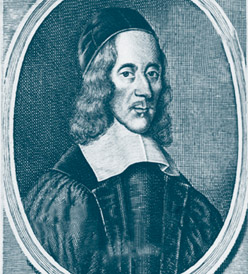|
Herbert and Hopkins:
'Yet sugaring the suspicion'
 Here are the opening quartet and closing couplet of Donne's Sonnet on
Death: "Death be not proud, though some have called thee Mighty and
dreadfull, for, thou art not soe, For those, whom thou think'st, thou
dost overthrow, Die not, poore death, nor yet canst thou kill me...One
short sleepe past, wee wake eternally, And death shall be no more, Death
thou shalt die." And here are the opening and closing stanzas of
Herbert's poem 'Death': "Death, thou wast once an uncouth hideous thing,
Nothing but bones, The sad effect of sadder grones; Thy mouth was open,
but thou couldst not sing...Therefore we can go die as sleep, and trust
Half that we have Unto an honest faithfull grave; Making our pillows
either down, or dust." Here are the opening quartet and closing couplet of Donne's Sonnet on
Death: "Death be not proud, though some have called thee Mighty and
dreadfull, for, thou art not soe, For those, whom thou think'st, thou
dost overthrow, Die not, poore death, nor yet canst thou kill me...One
short sleepe past, wee wake eternally, And death shall be no more, Death
thou shalt die." And here are the opening and closing stanzas of
Herbert's poem 'Death': "Death, thou wast once an uncouth hideous thing,
Nothing but bones, The sad effect of sadder grones; Thy mouth was open,
but thou couldst not sing...Therefore we can go die as sleep, and trust
Half that we have Unto an honest faithfull grave; Making our pillows
either down, or dust."
Both poems imply that death is a sleep from which one wakes. But
whereas Donne's attitude to death is agonistic, Herbert's is mild. The
former is defiant to the end, the latter resolute by the end. Yet,
Herbert's calm acceptance of death, as against Donne's impassioned
rejection of it, is by no means facilely obtained. It is as much, if not
more, a product, however different from Donne's, of the metaphysical
thought process. The last two lines are reassuring because they unite,
almost without our realising it, such contrary notions as the grave and
faithfulness, pillows and dust.
Life's sweetness
In fact, Herbert was preoccupied with the idea of transience. He has
at least four poems on the subject, 'Vertue', 'Mortification', 'The
Flower' and 'Life'. In the first the finality of death is
heartbreakingly contrasted with the sweetness of life in one of his most
beautiful openings: "Sweet day, so cool, so calm, so bright, The bridall
of the earth and skie: The dew shall weep thy fall to night; For thou
must die." Bridall here conveys the idea, not only that a new day brings
about a marriage of earth and sky, but that in its sweetness it is
somehow the bride of both. The ambiguity serves to heighten the sadness
of its impending end. And what could be sadder than the third verse?
"Sweet spring, full of sweet dayes and roses, A box where sweets
compacted lie; My musick shows ye have your closes, And all must die."
Sweets in this instance are perfumes and closes are the cadences with
which musical passages are concluded with a harmonic finality. The
imagery of sound both enhances and qualifies the imagery of sight and
scent.
|

George Herbert |
In 'Life' Herbert, noting how quickly the flowers in a posy he has
made have withered, continues: "I took, without more thinking, in good
part Time's gentle admonition: Who did so sweetly deaths sad taste
convey, Making my minde to smell my fatall day; Yet sugring the
suspicion." The thought of death is sugared by comparison with the fate
of the flowers. It is significant that for Herbert time is not the
baleful presence it usually is in poetry, - as for example in the
sonnets of Shakespeare - but a kindly mentor. A similar note was struck
by Emily Dickinson two and a half centuries and an ocean away: "Because
I could not stop for Death--He kindly stopped for me--"Her poem,
however, ended in terror, but not so Herbert's: "Farewell deare flowers,
sweetly your time ye spent...I follow straight without complaints of
grief, Since if my scent be good, I care not if It be as short as
yours."
As can be seen Herbert's imagery is not far-fetched like Donne's. It
is largely drawn from ordinary life and the world of nature. Yet this
seemingly humdrum and conventional imagery is employed with striking
originality. It is caused not just to illustrate the experience under
consideration but to explore it and to facilitate the understanding of
it. In 'Life', for instance, the scent of the flowers, a common enough
poetic reference, has a threefold significance.
It represents progressively the desirability of life, the transience
of life and the sweet influence of a virtuous life which is enhanced by
its very brevity. This metaphorical creativity is very much in the
tradition of Shakespeare, viz. "Lilies that fester smell far worse than
weeds."
But in Herbert it goes hand in hand with a plainness of expression
that anticipates Wordsworth's restoration of the "language really used
by men", eg. "my heart with pleasure fills, And dances with the
Daffodils."
Mother root
This plainness follows not only the diction but the rhythms of common
speech. "Who could have thought my shrivel'd heart Could have recover'd
greenness? It was gone Quite under ground; as flowers depart To see
their mother-root, when they have blown; Where they together All the
hard weather, Dead to the world, keep house unknown."
Note the skill with which enjambment and the mixture of long and
short lines are employed to reproduce the natural vigour of everyday
speech. This is from 'The Flower' where, again, the metaphor of flowers
is featured, but here representing the revival of one's creative
energies from a period of unproductivity - something all great poets
have known. "And now in age I bud again, After so many deaths I live and
write; I once more smell the dew and rain, And relish versing: O my
onely light, It cannot be That I am he On whom thy tempests fell all
night." And it is here that we realise Herbert's unmistakable influence
on Hopkins. The ultimate experience of this poem, as it is in Hopkins'
best verse, is that spirituality can be attended by anguish; and that
the expression of such anguish does not negate that spirituality, but
enhances it by revealing the struggle with which it has been won. In
this poem that realisation comes through the metaphysically explored
conceit of the flower, in whose history the cycle of life and death is
repeated. When Hopkins survived a spell of despair in which both his
spirituality and his creativity were at a low ebb, he surely had in mind
the just quoted verse of Herbert when he exclaimed, at the end of one of
his 'Terrible Sonnets', "That night, that year Of now done darkness I
wretch lay wrestling with (my God!) my God."
As always, poetic experience is determined by expression. If Hopkins
benefited from Herbert's experience it is because he had been influenced
by his style. In his moments of despair Herbert turns to the imagery of
nature for comfort.
Here again is that verse we quoted last week from 'Affliction': "I
reade, and sigh, and wish I were a tree; For sure then I should grow To
fruit or shade: at least some bird would trust Her household to me, and
I should be just." And here is Hopkins resorting to the natural world in
a similar moment: "and fresh wind shakes Them; birds build - but not I
build; no, but strain, Time's eunuch, and not breed one work that wakes.
Mine, O thou lord of life, send my roots rain."
Two styles
Towards the end of his life Hopkins, having explored the full
resources of the English language after the manner of Shakespeare, seems
to have been moving towards that ideal combination of figurativeness and
plainness of style which Herbert displays throughout. Consider the
beautifully simple, but not typically Hopkinsian, opening of the sonnet
whose last lines have just been quoted above: "Thou art indeed just,
Lord, if I contend With thee; but sir, so what I plead is just. Why do
sinners' ways prosper? And why must Disappointment all I endeavour end?"
The sonnet as a whole represents a fine merger of the two styles.
The poem with which we would like to end this two-part consideration
of Herbert's poetry is 'The Collar'. Like its partner, 'Affliction',
with which we concluded last week's article, it is a poem of conflict,
yet even more so.
That poem was in the nature of an elegy on the impasse at which he
found himself. This is more an assertion of self-determination, the
"collar" evidently meant to represent the clerical collar as well as the
article of animal restraint. A note of agitated indignation is struck at
the very outset: "I struck the board, and cry'd, No more.
I will abroad, What? Shall I ever sigh and pine?" He is determined to
regain the independent, carefree life of his past : "Recover all thy
sigh-blown age On double pleasures: leave thy cold dispute Of what is
fit, and not. Forsake thy cage..." The raging intensifies towards the
end and a resolution seems impossible. But then we have this amazing
conclusion: "But as I rav'd and grew more fierce and wilde At every
word, Me thought I heard one calling, Child! And I reply'd, My Lord." It
seem to be a forced resolution, but it is as spontaneous as it is
sudden. And it is perhaps the strongest indication we have that the
devotional motivation of Herbert's poetry is genuine. Here again, the
similarity with Hopkins is only too clear. |





